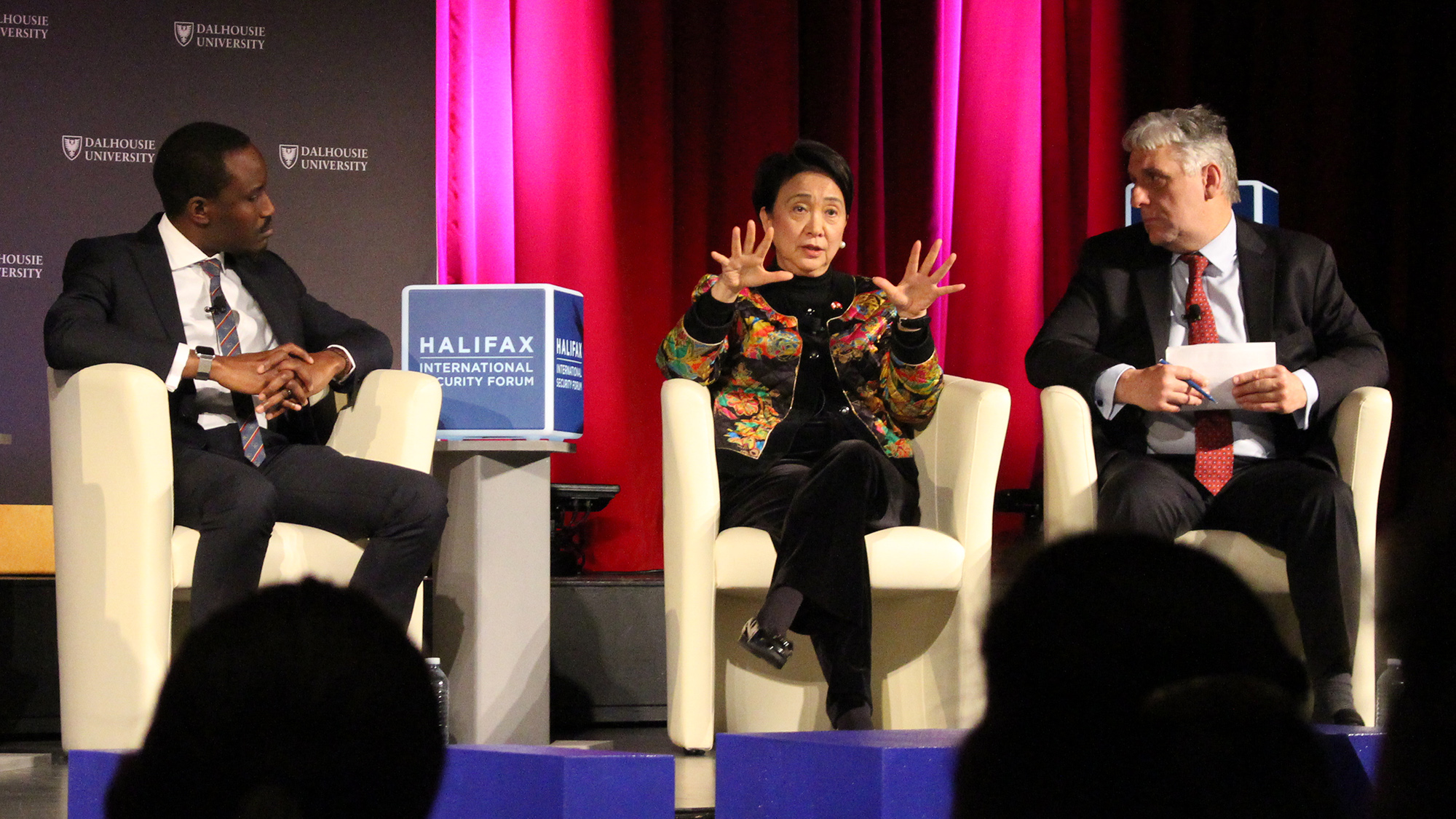International community urged to show support for Hong Kong
Panel discusses the Hong Kong protests and the future of democracies

caption
Emily Lau (centre) speaks at the Halifax International Security Forum at Dalhousie University on Thursday.A member of the Democratic Party of Hong Kong is encouraging the international community to show their support for protesters fighting against the Chinese government.
Thursday night, Emily Lau participated in a panel discussion hosted by the Halifax International Security Forum at Dalhousie University.
She spoke about the impact that Western support can have on the Hong Kong protests.
“Do not be frightened when China scolds you, because China loves to do that,” said Lau in reference to Canada speaking in support of the protesters.
Lau, the chairperson of the Democratic Party’s Foreign Affairs Committee, has been a champion for human rights and freedom of speech for decades. She was arrested on numerous occasions for her pro-democracy views. In 1991 she became the first woman to be directly elected on the Legislative Council of Hong Kong and has been the recipient of many awards for her work in politics and human rights.
In April, the Chinese government introduced a bill that would allow it to extradite criminals in Hong Kong to mainland China, sparking fear that it would give China greater authority over Hong Kong and allow it to target activists and journalists.
China and Hong Kong currently operate as one country, two systems, which means Hong Kong is part of China but remains autonomous in many ways. The bill was withdrawn in September, but protests have continued and continue to grow increasingly violent on both sides, with police tear gassing and even shooting protesters, and protesters throwing Molotov cocktails and setting a man on fire.
Canada has put out travel warnings, due to the escalating conflicts.
Recently, protesters barricaded themselves in the Hong Kong Polytechnic University but many have since been forced to turn themselves in or plan dangerous escapes due to poor conditions. Those caught by police face up to 10 years in prison.
Lau encourages the international community to keep showing their support for Hong Kong. She says it encourages the Hong Kong people to keep fighting for their rights and it makes China pay attention because it cares about its appearance on the international stage.
Lau commended the U.S. for passing the Hong Kong Human Right and Democracy Act. She said it encouraged more protesters to go out and protest at a shopping mall. She equally applauded Angela Merkel, Germany’s chancellor, for the comments she made when visiting China in September.
“We want the world to watch and to be our friends and to tell China to exercise restraint,” said Lau.
She was candid about the reality of the challenges that Hong Kong will face when negotiating with the Chinese government and talked about China’s brutality within mainland China and its threats against Taiwan.
Tension between the Chinese government and Taiwan has grown over the years, mostly because China views the island as a province, but the political leaders of Taiwan — which has its own democratically elected government — have a more independent view of their relationship with the mainland.
Lau said that if Taiwan dared to declare its independence, the Chinese government has threatened to “wage war with Taiwan.”
When asked what she thought the protesters’ aim was, she started by laughing and saying she could not speak for them and that the “big thing” about the protest is that it does not have a leader.
“Everyone speaks for themselves,” said Lau.
She said people are very worried about “everything disappearing,” meaning Hong Kong’s free lifestyle.
China’s agreement with the British government to keep Hong Kong an autonomous status only extends until 2047.
“We’re going to fight. We’re going to fight from now until 2047 and beyond,” said Lau.
Lau said what the protesters want is beyond the extradition bill. Now, it’s about preserving the autonomy and lifestyle that they currently enjoy and making China accountable to the promise it made, not only to the U.K., but also to the international community to respect Hong Kong’s autonomy.
Lau was invited to sit on the panel with several other experts at the security forum: Tolu Ogenusi, special head of the Presidency Office of Digital Engagement in Nigeria; Janice Stein, founding director of the Munk School of Global Affairs and Public Policy; Roderich Kiesewetter, member of the German Bundestag.
The event concluded with the panellists discussing their views on the future of democracy.
Lau said that her view for the future is “very pessimistic.” She said that she has seen a noticeable decline in democracy and not just in her own country.
“Many things that people take for granted can disappear very quickly,” said Lau.
She encourages people to continue speaking out for their rights and protesting in a peaceful manner.
About the author
Chelsea Cleroux
Chelsea is a student journalist at the University of King's College in Halifax. She has a degree in Political Science from the University of...
